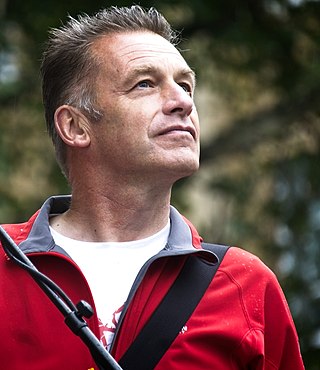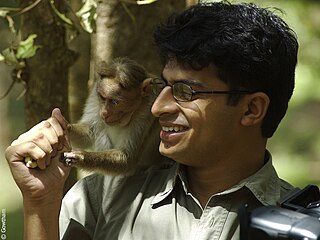
Doctor Who is a British science fiction television series broadcast by the BBC since 1963. The series, created by Sydney Newman, C. E. Webber, and Donald Wilson, depicts the adventures of an extraterrestrial being called the Doctor, part of a humanoid species called Time Lords. The Doctor travels in the universe and in time using a time travelling spaceship called the TARDIS, which externally appears as a British police box. While travelling, the Doctor works to save lives and liberate oppressed peoples by combating foes. The Doctor often travels with companions.

Sir David Frederick Attenborough is a British broadcaster, biologist, natural historian and author. He is best known for writing and presenting, in conjunction with the BBC Natural History Unit, the nine natural history documentary series forming the Life collection, a comprehensive survey of animal and plant life on Earth.

Life on Earth: A Natural History by David Attenborough is a British television natural history series made by the BBC in association with Warner Bros. Television and Reiner Moritz Productions. It was transmitted in the UK from 16 January 1979.

The Blue Planet is a British nature documentary series created and co-produced by the BBC and Discovery Channel. It premiered on 12 September 2001 in the United Kingdom. It is narrated by David Attenborough.

George Richard Ian Howe, known professionally as George Fenton, is an English composer. Best known for his work writing film scores and music for television, he has received five Academy Award nominations, several Ivor Novello, BAFTA, Golden Globe, Emmy and BMI Awards, and a Classic BRIT. He is one of 18 songwriters and composers to have been made a Fellow of the Ivors Academy.
The BBC Studios Natural History Unit (NHU) is a department of BBC Studios that produces television, radio and online content with a natural history or wildlife theme. It is best known for its highly regarded nature documentaries, including The Blue Planet and Planet Earth, and has a long association with David Attenborough's authored documentaries, starting with 1979's Life on Earth.

Christopher Gary Packham CBE is an English naturalist, nature photographer, television presenter and author, best known for his television work including the CBBC children's nature series The Really Wild Show from 1986 to 1995. He has also presented the BBC nature series Springwatch, including Autumnwatch and Winterwatch, since 2009.

A nature documentary or wildlife documentary is a genre of documentary film or series about animals, plants, or other non-human living creatures, usually concentrating on video taken in their natural habitat but also often including footage of trained and captive animals. Sometimes they are about wildlife or ecosystems in relationship to human beings. Such programmes are most frequently made for television, particularly for public broadcasting channels, but some are also made for the cinema medium. The proliferation of this genre occurred almost simultaneously alongside the production of similar television series which is distributed across the world.

Neil Nightingale is a British freelance wildlife filmmaker, executive producer and creative consultant with over 35 years experience at the BBC. From 2009 to 2018 he was the creative director of BBC Earth, BBC Worldwide's global brand for all BBC nature and science content.
The Kalahari Meerkat Project, or KMP, is a long term research project focused on studying the evolutionary causes and ecological consequences of cooperative behaviors in meerkats. The secondary aims of the project are to determine what factors affect the reproductive success of the meerkats and what behavioral and physiological mechanisms control both reproduction and cooperative behavior. The project is also working on monitoring overall plant and animal populations within the reserve and work with the nearby community of Van Zylsrus in the areas of conservation and sustainable use of resources.

All3Media Limited is a British worldwide independent television, film, and digital production and distribution company based in London, England. The All3Media group comprises more than 50 production and distribution companies and labels from across the United Kingdom and all other parts of Europe, New Zealand and the United States.

Nature's Great Events is a wildlife documentary series made for BBC television, first shown in the UK on BBC One and BBC HD in February 2009. The series looks at how seasonal changes powered by the sun cause shifting weather patterns and ocean currents, which in turn create the conditions for some of the planet's most spectacular wildlife events. Each episode focuses on the challenges and opportunities these changes present to a few key species.

Yellowstone is a BBC nature documentary series broadcast from 15 March 2009. Narrated by Peter Firth, the series takes a look at a year in the life of Yellowstone National Park, examining how its wildlife adapts to living in one of the harshest wildernesses on Earth. Yellowstone debuted on BBC Two at 8:00pm on Sunday 15 March 2009 and has three episodes. Each 50-minute episode was followed by a ten-minute film called Yellowstone People, featuring visitors to the Park and locals who had assisted the production team. The series was the channel's highest-rated natural history documentary in over five years with audiences peaking at over four million.

Mark Linfield is a British writer, producer and director of nature documentaries for cinema and television. He is best known for his work with the BBC Natural History Unit as a producer of two episodes of the television series Planet Earth (2006) and as writer and co-director of the associated feature film Earth (2007).

Mike Gunton is a British television producer and a senior executive at the BBC Natural History Unit, the world's largest production unit dedicated to wildlife film-making. In November 2009 he became the Unit's first Creative Director.
Keith Scholey is a British producer of nature documentaries for television and cinema, and a former television executive. He is the joint series producer of the Netflix original documentary series Our Planet, the joint director and executive producer of David Attenborough: A Life on Our Planet, and executive producer of Breaking Boundaries: The Science of Our Planet. He is the executive producer of the 2021 BBC / Discovery series A Perfect Planet, The Mating Game and The Earthshot Prize: Repairing Our Planet. He also co-directed African Cats, Bears, and Dolphin Reef with Alastair Fothergill for Disneynature, and is also the executive producer of the series North America for the Discovery Channel.

Madagascar is a British nature documentary series, first broadcast on BBC Two and BBC HD in February 2011. Produced by the BBC Natural History Unit and Animal Planet and narrated by David Attenborough, the three-part series focuses on the landscape and wildlife of the island of Madagascar in the Indian Ocean. Attenborough also appears briefly on camera at the beginning and end of the series. Each episode is followed by a ten-minute Madagascar Diaries segment, illustrating the techniques used to film a particular subject.

Kalyan Varma is a Bangalore-based wildlife emmy nominated filmmaker, photographer and conservationist. He is one of the founders of Peepli Project, co-director of Nature InFocus nature and wildlife festival, and founding member of India Nature Watch. He currently freelances with BBC Natural History, Netflix, Discovery Channel, National Geographic and Disney+, and also works with grassroots NGOs like Nature Conservation Foundation to highlight environmental issues in India. He is a recipient of the National film awards for his film Wild Karnataka and Carl Zeiss Wildlife Conservation Award.
Planet Earth is a television and film documentary franchise produced and broadcast by the BBC. The franchise began in 2001 with the success of The Blue Planet. As of 2017, The Blue Planet has spawned 5 series and one feature film.

Our Planet is a British nature documentary series made for Netflix. The series is narrated by David Attenborough and produced by Silverback Films, led by Alastair Fothergill and Keith Scholey, who also created BBC documentary series Planet Earth, Frozen Planet and The Blue Planet, in collaboration with the conservation charity World Wildlife Fund (WWF). The soundtrack was composed by Steven Price.















